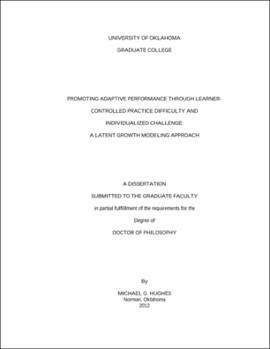| dc.description.abstract | In any learner-controlled, active learning environment, the choices one makes can influence both the objective training difficulty and individualized levels of trainee challenge faced during learning. Despite research suggesting that certain difficulties experienced while learning can be beneficial for promoting knowledge, skill, and transfer (R. A. Schmidt & Bjork, 1992), the roles of learner-controlled practice difficulty and associated levels of individualized challenge are not well understood. Moreover, research has yet to examine empirically the nature of the cause-and-effect relationships between active learning behaviors and related psychological processes, and single measures of adaptive transfer are typically used despite the multidimensional nature of training transfer (Barnett & Ceci, 2002). Therefore, the present study examined these issues by giving 152 male participants control over their practice difficulty operationalized in terms of objective levels of task complexity while playing a complex videogame. Results revealed that metacognition and self-efficacy each exhibited positive influences on learner-controlled practice difficulty. Furthermore, both the overall average level and growth of practice difficulty had positive relationships with basic knowledge and post-training performance. The overall average level of practice difficulty was also positively related to strategic knowledge. Conversely, growth of individualized challenge had negative relationships with knowledge and post-training performance. In turn, post-training performance mediated the influences of difficulty and challenge on three distinct types of adaptive transfer performance. Findings are discussed with respect to the beneficial role of practice difficulty during training as well as the need to use multidimensional assessments of transfer outcomes. | |
